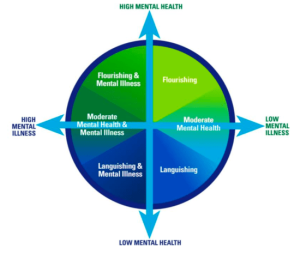
 Mental health includes our emotional, psychological, and social well-being. It affects how we think, feel, and act. It also helps determine how we handle stress, relate to others, and make healthy choices. Mental health is important at every stage of life, from childhood and adolescence through adulthood.
Mental health includes our emotional, psychological, and social well-being. It affects how we think, feel, and act. It also helps determine how we handle stress, relate to others, and make healthy choices. Mental health is important at every stage of life, from childhood and adolescence through adulthood.
In 1998, the President of the American Psychological Association, Dr. Martin Seligman argued that psychologists were overly focused on what was wrong with people and could therefore not identify what was right. If researchers and practitioners wanted to help people reach their full potential, he said, greater emphasis needed to be given to understanding how to build positive qualities.
Emotional wellbeing reflects how happy we feel and how satisfied we are with our life. Psychological wellbeing measures how well we are functioning psychologically and includes self-acceptance, personal growth, mastery over our environment and purpose in life. Social wellbeing reflects how well we are functioning socially and includes a sense of belonging to a community, making contributions to society and being accepting of human differences (Keyes, 2007).
Paradigm shifts: How to think about mental health
There are several conclusions from Keyes’s research that represented fundamental shifts in how mental health and mental illness were understood at the time.
Mental health is not the opposite of mental illness
The absence of mental illness does NOT imply the presence of mental health, and the absence of mental health does not imply the presence of mental illness.
Case illustrations: Leroy and Kailee
Leroy was diagnosed with anxiety a few years ago. He experiences a few symptoms these days. He takes medication as prescribed, sees his therapist, and does other things to manage his condition. Leroy enjoys his job at the local hardware store and is considered by other employees as a good capable employee. He states his life has meaning, and has some positive, close relationships with friends and family. Leroy has a mental illness but also has a high level of mental health.
Kailee is a recent college graduate and a new hire at a local IT company. Although she has no mental illness, her mental health has been deteriorating over the last six months due to a bitter divorce and custody dispute. Kailee has noticed a substantial reduction in her performance over the last few weeks as her next court date is approaching. Kailee feels unhappy most days and is extremely dissatisfied with her life and relationships. She has a low level of mental health without having a mental illness.
Historically, there has been a stigma with getting mental health care but not for getting help for physical problems. This stigma prolonged the suffering of many people and has even cost lives.
Seeking out care for mental health concerns is a sign of strength and there is robust evidence that demonstrates that mental health care is effective.
988 has been designated as the new three-digit dialing code that will route callers to the National Suicide Prevention Lifeline (now known as the 988 Suicide & Crisis Lifeline), and is active across the United States.
Anyone can call the Lifeline, whether they are thinking about suicide or not, and get emotional support. There is no minimum age, and you can receive support at any time, even on holidays. As long as you have a phone, you can call the number and talk to someone
SubRosa Mental Services provides a client-forward approach to helping individuals, businesses, and children, in addition to offering life coaching and emotional support animal assistance. Reach out today to find out more.

